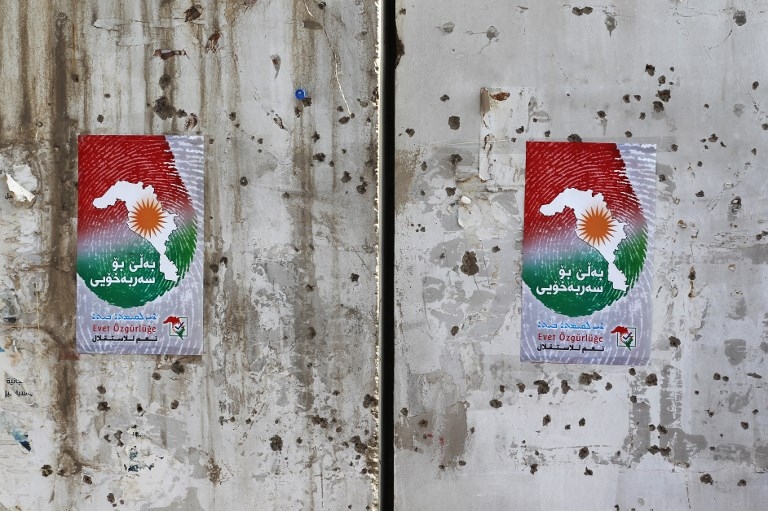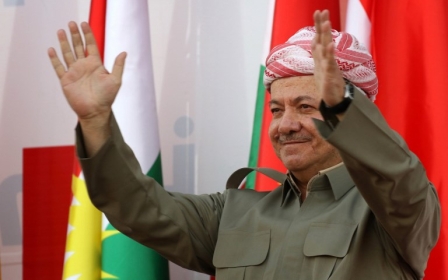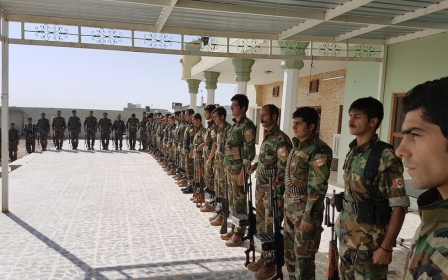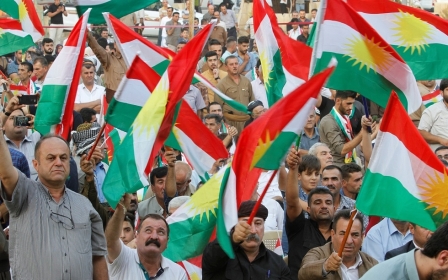Iraq PM pledges to take 'necessary measures' ahead of Kurd vote

Iraq's prime minister pledged on Sunday to take all the "necessary measures" to protect the country's unity a day before its autonomous Kurdish region votes in a referendum on independence.
The Iraqi government then asked the Kurdish authorities to hand over international border posts and international airports, retaliating against the referendum to be held on Monday in northern Iraq.
It also asked foreign countries to stop oil trading with the Kurdish region and to deal with the central government in regards to airports and borders, said a statement published by Prime Minister Haider al-Abadi's office.
Earlier, Abadi spoke in a televised address following Kurdish leader Massud Barzani's statement that the Kurds' partnership with Baghdad had failed, and that the plebiscite would proceed as planned.
Abadi said that taking a unilateral decision to stage a referendum affected both Iraqi and regional security and was "unconstitutional and against civil peace".
"We will take the necessary measures to preserve the unity of the country," he said.
He added that "we will not permit anyone to play with Iraq and not pay the consequences".
Earlier, Barzani urged his people to turn out and vote on Monday.
"The partnership with Baghdad has failed and we will not return to it," he said.
Barzani has resisted pressure from Baghdad, neighbouring states and Washington to call off the referendum and negotiate a new deal.
"The referendum is not for defining borders or imposing a fait accompli. We want a dialogue with Baghdad to resolve the problems, and the dialogue can last one or two years," Barzani said of disputed zones such as oil-rich Kirkuk.
Iraq's neighbours Iran and Turkey strongly oppose the referendum, as both have their own Kurdish minorities and fear the vote will stoke separatist aspirations at home.
Tehran upped the pressure on Sunday, saying it had blocked all flights to and from Kurdistan at Baghdad's request.
Washington and many Western countries had called for the vote to be postponed or cancelled, saying it would hamper the fight against the Islamic State group.
But in regional capital Erbil, Barzani's political heartland, Kurdish flags were flying everywhere on Sunday.
Most in the city said they would vote, but some also feared the possible consequences.
"We look forward to hearing what the situation will be after September 25, as most Kurds will vote for independence to fulfil our dream of an independent state," said labourer Ahmad Souleiman, 30.
"What we're afraid of is that our enemies have evil intentions towards us."
Turkish Prime Minister Binali Yildirim again denounced the referendum on Sunday, saying it would "further fuel existing instability, lack of authority and chaos in the region".
About five million Kurds are expected to vote in the three provinces that have since 2003 formed the autonomous region of Kurdistan, but also in territories disputed with Baghdad such as the oil-rich province of Kirkuk.
While an independent homeland has long been an aspiration in the Kurdish diaspora, the ethnic group's two main parties in Iraq differ on how to make it a reality.
Barzani's Kurdistan Democratic Party (KDP) and the Patriotic Union of Kurdistan (PUK) of Jalal Talabani, a former president of Iraq, are at opposite ends of the spectrum politically on the issue.
The PUK has backed an alternative plan put forward by the United Nations, and supported by Washington, for immediate negotiations on future relations in exchange for dropping the referendum.
In Sulaymaniyah, the PUK-controlled second city of the autonomous Kurdish region, enthusiasm for the vote was muted.
"I will vote 'no' tomorrow because I'm afraid of an embargo on the region, of civil war with the Hashed al-Shaabi (grouping of Shia paramilitaries), and waking up and seeing Turkish soldiers patrolling," said 30-year-old teacher Kamiran Anwar.
The most sensitive sticking point is Kirkuk, where there was a run on food supplies in the city Saturday as residents stocked up in case of post-referendum trouble.
Home to Kurds, Arabs and Turkmens, Kirkuk is disputed between the federal government and Iraq's Kurds who say it is historically theirs.
They argue that the late dictator Saddam Hussein chased them out and replaced them with Arabs.
Threats are growing inside Iraq against the Kurdish move.
"There will be a high price to pay by those who organised this referendum, a provocation aimed at destroying relations between Arabs and Kurds," said Hashed al-Shaabi leader Faleh al-Fayad.
"As soon as the referendum takes place there will be a legal and constitutional reaction."
The Hashed grouping of paramilitary units was created in 2014 to battle IS.
Iran's elite Revolutionary Guards began military exercises Sunday along the border with Iraqi Kurdistan.
Such exercises are common in the region, because of the persistent threat posed by Kurdish separatists who regularly carry out cross-border attacks against Iranian security forces.
Middle East Eye propose une couverture et une analyse indépendantes et incomparables du Moyen-Orient, de l’Afrique du Nord et d’autres régions du monde. Pour en savoir plus sur la reprise de ce contenu et les frais qui s’appliquent, veuillez remplir ce formulaire [en anglais]. Pour en savoir plus sur MEE, cliquez ici [en anglais].




